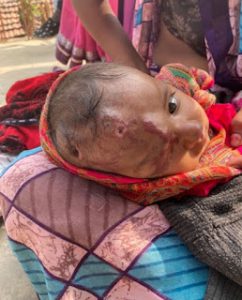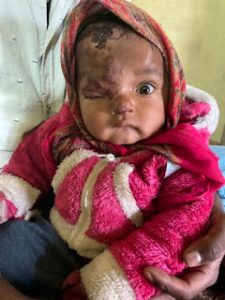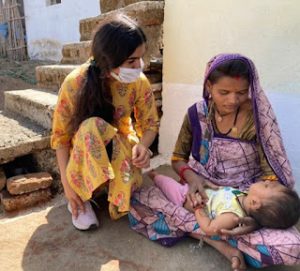


“Methi ki sabzi” (a leafy vegetable commonly eaten in India), Gayatri announced excitedly over the phone when I asked her what she was making for lunch. Gayatri is an ASHA Supervisor, who proudly claims her position and oversees the work of 14 ASHAs (community health mobilizers). I met baby Prachi on the day I was accompanying Gayatri to a VHND (Village Health and Nutrition Day) in her village, Barela. VHNDs are organized monthly in each village, when critical maternal, child health and nutrition services such as ante-natal check-ups, immunizations, and nutrition services are delivered by frontline health workers to mothers and children. This one day can save many lives and significantly help reduce maternal, newborn and child deaths. A crucial element of our interventions is to train frontline workers on delivering timely and quality health services during VHNDs, ensuring every beneficiary due is attended to.
“Namaste!”, the ANM (Auxiliary Nurse Midwife – the village nurse), the ASHA, and the Anganwadi worker greeted me with warm smiles as I entered the anganwadi center. While the ANM explained to the mothers why it was necessary for their children to be timely vaccinated, a woman walked in with a five-month-old baby and her mother-in-law. As I moved towards them, I saw the baby had, what looked at the time, boils all over her face and her right eye was completely shut due to the infection. I sat next to them and asked the baby’s name. “Prachi” the mother whispered as she looked worriedly at her child.

Prachi, when I first met her
On probing further, I got to know that Prachi was admitted to the Special Newborn Care Unit (SNCU) for seizures after birth. The family had not taken her back for the mandatory follow-ups as the seizures had stopped after a while and they assumed that Prachi was now fully recovered. The mother-in-law informed us that after Prachi turned two months old, she developed a few boils which later spread to her entire face. “Kya kiya fir amma, kahan leke gayi Prachi ko?” (What did you then? Where did you take Prachi?) I asked, to which the mother-in-law replied, “hamare baba ke pass leke gaye, par phir jab kuchh thik nahi hua to Nagpur private hospital leke gaye” (we took the baby to a traditional healer, but when there was no improvement, we took her to a private hospital in Nagpur). She explained that after Prachi came back from the SNCU, they did not want to take her back to another government facility. They believed that Prachi would be treated more quickly and efficiently in a private facility.
What can we do now? I asked the frontline workers in front of me, “Ab kuchh nahi hoga, shayad, aankh to nahi bachegi” (now nothing can be done, most probably we won’t be able to save the eye) the ANM replied. I asked Gayatri why she hadn’t informed the Rashtriya Bal Swasthya Karyakram (RBSK) team about Prachi’s case. RBSK is a program under the National Health Mission which involves screening children until age-18 for defects at birth, diseases, deficiencies, and development delays. The services are provided free of cost. There seemed to be low awareness amongst the supervisors and frontline workers on how to contact the RBSK team.
By now, baby Prachi had finished crying after receiving her immunization, and they were ready to leave. Her mother informed me that they couldn’t afford to continue Prachi’s treatment in Nagpur. I asked the mother-in-law to share Prachi’s medical records. By the time I left the field, my phone was filled with Prachi’s pictures; a baby that I didn’t know existed until yesterday seemed to now occupy my mind and my phone’s memory.
I discussed the case with Harhini, the Senior Program Officer in my district, who has been an incredible mentor to me since I started my Fellowship at TAF. Neeraj, Senior Program Lead joined our discussion. As a team, we thought about which block officials to approach, how to present facts to them, and most importantly how do we ensure that baby Prachi gets the care that she needs. The next morning, I fixed up a meeting with block officials; by evening I was sitting in their office explaining to them the urgency of the situation and the promptness needed to save baby Prachi’s eye. They listened attentively, noted down all the facts, and called the RBSK coordinator right away. I received a message the next day that an RBSK team had visited Prachi and after a thorough check-up, referred her to the government hospital in Jabalpur. They assured the family that the treatment would be completely free.
Within a span of just three days, through teamwork and coordination with block officials, we could get Prachi the medical treatment she deserved! A month later, Gayatri called to inform me that Prachi had received her treatment in Jabalpur and was doing much better. The following week I went to baby Prachi’s home. I remember, in one of my conversations with Ashok, Founder-Director of Antara Foundation, he had said something to me that I often think about, “I want this Fellowship to become more than a job for you.” That day, in Barela, when I saw baby Prachi slightly open her right eye, I knew that the Fellowship had become more than a job for me.

Baby Prachi after receiving treatment at Jabalpur. There is still a long recovery ahead of her, however, with our regular follow-ups and continuous medication, the doctor believes there can be significant improvement.
Prachi’s story goes a long way to suggest that there are government systems in place, but one really needs to tap into the resources to ensure that beneficiaries are able to access and utilize the services. Recently, Gayatri found another baby in her sub-health center who had a severe infection in her ear, along with pneumonia. This time, she immediately coordinated with her supervisor, called the RBSK team by herself, and within a span of a few hours got the ambulance to take the child to the district hospital. She took ownership of the case, waited for the ambulance, and gave regular updates of the case. Like Gayatri, other supervisors in the block have become more attentive to critical beneficiaries like Prachi and now they know who to reach and how.
I often go to visit baby Prachi’s home with the frontline workers. “Prachu” (Prachi’s nickname”), her grandfather calls her name while doing tricks to make his favorite grandchild laugh. Prachi smiles often and claps excitedly when her grandfather plays peek-a-boo with her.
“We wish your organization keeps helping more children like Prachi”, her grandfather said to me.

Snigdha on one of her recent visits to meet Prachi SHARE